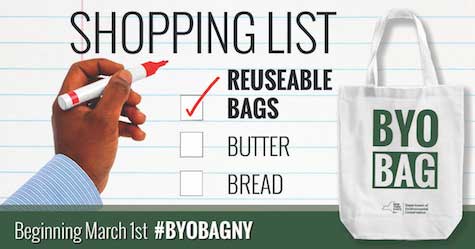DEC answers questions about plastic bag law, which takes effect on March 1
Press Release, NYS Department of Environmental Conservation

Courtesy of Department of Environmental Conservation
What is the Plastic Bag Waste Reduction Law?
Article 27 of the Environmental Conservation Law (ECL) has been amended to create a new Title 28 for the New York State Bag Waste Reduction Act. The law takes effect March 1, 2020 and prohibits the distribution of plastic carryout bags by retailers in New York state.
Which retailers are no longer allowed to provide plastic bags?
Any person required to collect tax will no longer be able to provide plastic carryout bags, as defined in Title 28 of the ECL, to their customers.
What does the term “plastic carryout bag” mean? Does this include all plastic bags?
“Plastic carryout bag” means any film plastic bag, other than an exempt bag, that is provided to a customer by a person required to collect tax to be used by the customer to carry tangible personal property, regardless of whether such person required to collect tax sells any tangible personal property or service to the customer, and regardless of whether any tangible personal property or service sold is exempt from tax under Article 28 of the New York State Tax Law.
“Exempt bag” means a bag that is:
• Used solely to contain or wrap uncooked meat, fish, seafood, poultry, or other unwrapped food, flower, or plant item;
• Used by a customer solely to package items from bulk containers, including fruits, vegetables, grains, candy, small hardware items (such as nuts, bolts, and screws), live fish, or live insects;
• Used solely to contain food sliced or prepared to order;
• Used solely to contain a newspaper for delivery to a subscriber;
• Sold in bulk quantities to a consumer at the point of sale that were specifically prepackaged in a manner to allow for bulk sale (for example, quantities of bags prepackaged in individual pre-sealed boxes) or prepackaged in individual boxes or containers for sale to a customer;
• Sold as a trash bag;
• Sold as a food storage bag, such as those in snack, sandwich, quart, and gallon sizes;
• Used as a garment bag, such as those used by a dry cleaner or laundry service;
• Provided by a restaurant, tavern, or similar food service establishment, as defined in the state sanitary code, to carry out or deliver food;
• Provided by a pharmacy to carry prescription drugs;
• A reusable bag, as that term is defined in proposed Part 351 draft regulations; or
• A film plastic bag for which there is no reasonable or practical alternative for storing, containing or transporting items, as determined by the department.
What is considered a reusable bag? What does the term “durable” mean within the definition of a reusable bag?
“Reusable bag” means a bag that:
• Is specifically designed and manufactured for multiple reuses;
• Has a minimum lifespan of 125 uses, with a use equal to the ability to carry a minimum of 22 pounds over a distance of at least 175 feet;
• Holds at least 22 pounds for the duration of the lifespan of the bag;
• Has at least one strap or handle that is separately attached, does not stretch and is fastened to the bag in such a manner that it allows the bag to meet the strength and durability standards in paragraphs 351-1.2(n)(2) and (3) of proposed Part 351 draft regulations, unless otherwise approved by the department; and
• Is hand washable or machine washable;
• Has a minimum thickness of 10 mils for bags made of petroleum-based or non-petroleum-based low-density polyethylene (LDPE) or high-density polyethylene (HDPE) or other plastic material of petroleum or non-petroleum origin;
• Has a minimum fabric weight of 80 grams per square meter (GSM) for bags made of any non-film plastic of natural, synthetic, petroleum based, or non-petroleum-based origin, including woven or nonwoven polypropylene (PP), polyethylene-terephthalate (PET), cotton, jute, or canvas; is made of a combination of the materials specified in subparagraphs 351-1.2(n)(5)(i) and (ii) of proposed Part 351 draft regulations; or has a design of equivalent material strength and durability, as approved by the department.
How does this law affect the current NYS Plastic Bag Reduction, Reuse and Recycling Law? Can consumers bring in exempt bags, leftover bags, and other film plastic to be recycled?
This law expressly keeps the requirements for retail stores required under Title 27 of Article 27 of the ECL to continue to collect film plastic from consumers for recycling.
Is it sanitary to reuse bags?
Yes, one of the benefits of reusable bags is that they can be cleaned regularly.
If consumers buy prepared food at a grocery/retail/convenience store, or pick up a prescription from a pharmacy inside a retail store, can they receive a plastic bag?
Yes, but only for those specific items. Plastic bags used solely to contain food sliced or prepared to order or are provided by a pharmacy to carry prescription bags are considered exempt uses, regardless of location. In locations where a local law has been passed implementing the 5-cent paper carryout bag reduction fee, such fee would not be charged on a paper carryout bag provided by a pharmacy to carry prescription drugs, since the fee only applies to paper bags that serve as an alternative to banned film plastic bags.
Can supermarkets package groceries for home delivery in plastic bags or are those bags also banned?
The law does not have a specific exemption for plastic bags used for the home delivery of groceries. If the plastic bag is provided by a supermarket, and the plastic bag is to be used by the customer to carry groceries, then the supermarket will no longer be able to package groceries in plastic bags for home delivery.
However, the exemptions for bags used to contain food sliced or prepared to order, bags used to contain unwrapped meat, fish or poultry, and bags used to package bulk items, such as fruits, vegetables, grains and candy apply. So plastic bags could be used to contain these items, thereby keeping items separated and free from contamination from other items and providing some protection against spills from raw meat containers. These exempt plastic bags could then be placed in reusable bags or paper carryout bags for delivery to the consumer.
Paper Carryout Bag Reduction Fee
Beginning March 1, the New York State Bag Waste Reduction Act authorizes counties and cities to impose a 5-cent paper carryout bag reduction fee on paper carryout bags that certain sales tax vendors provide to customers. It also bans businesses from providing plastic carryout bags to customers, unless such bags are exempt bags.





































































